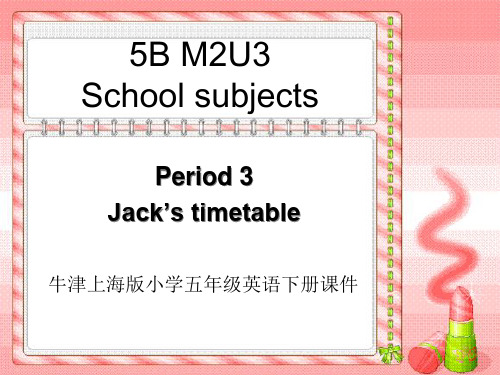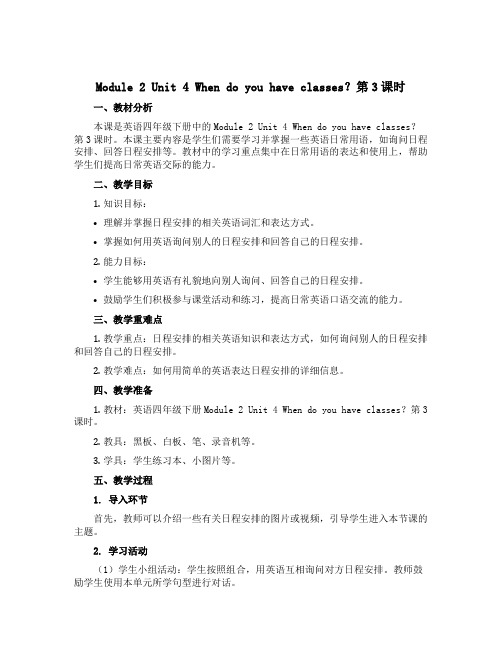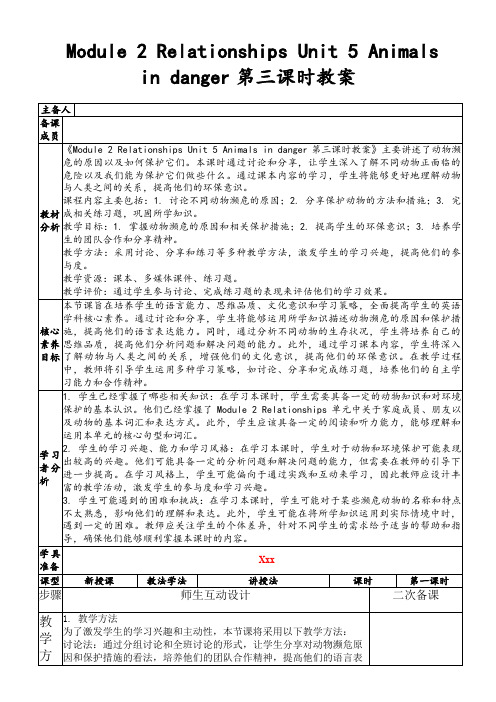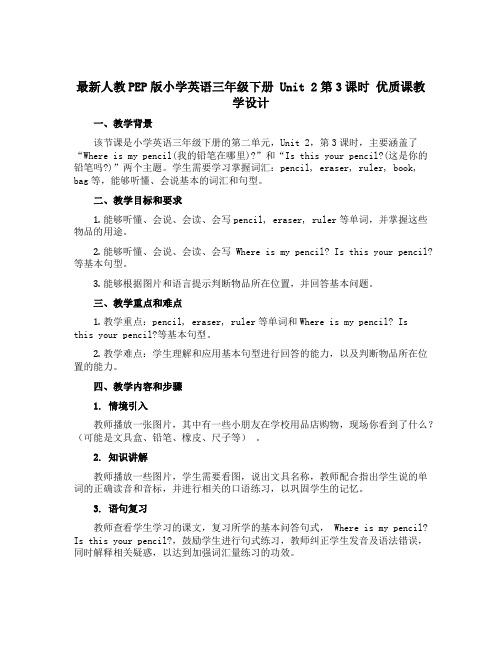Module2 3课时
五年级下册英语教学设计-Module 2第三课时Unit 2 1~3 外研版(三起)

五年级下册英语教学设计-Module 2第三课时Unit 2 1~3 外研版(三起)一、教学目标1.通过本课学习,学生能够听懂、了解并掌握生日派对上常用的英语表达。
2.学生能够运用所学知识,描述自己或他人的生日派对。
3.学生能够听懂简短对话,并通过模仿、角色扮演等形式进行语言输出。
4.了解生日派对的文化背景,激发学生的学习兴趣。
二、教学重难点重点1.生日派对用语的掌握:如Happy birthday!、blow out the candles、eat cake、open presents等。
2.生日派对场景的描述。
难点1.口语表达训练:如何自然流畅地表达句子。
2.学生间进行英语交流,激发其口语表达自信心。
三、教学内容与活动设计课前准备•教师在教室内张贴各种生日 related 的图片,例如:birthday cake、balloon、gift、party hat、candle、invitation card 等等。
1. Warming-up•教师Show several pictures about birthday parties, ask the students what they see. Then teacher ask what day is one student’s birthday.2. New words learning•教师学生重点讲解新单词:•invite、presents、cake、ribbon、candle、blow、wish 等。
•教师运用图片和举例子的方法,帮助学生加深对单词的印象并感受单词所表达的意思。
3. Listening•Teacher plays the recording of the dialogue, let the students listen and try to understand the dialogue。
•教师可运用接龙的方式反复播放听力,帮助学生更好地理解、记忆。
module2unit5第3课时课件沪教牛津版英语四级下册

七彩课堂 2. 复习了下列句型:
(1)—Does Alice like playing football?
伴你成长 爱丽丝喜欢踢足球吗? —Yes,she does. 是的,她喜欢。 这是does引导的一般疑问句,用来询问他人是否 喜欢某项活动。
七彩课堂 伴你成长
Homework
1. 复习并默写本单元的重点单词和短语。 2. 复习掌握本单元的重点句型。 3. 掌握ll的发音并找出更多含有ll的单词。
us
Let’s chant. Football, football. I like playing football. Basketball, basketball. He likes playing basketball.
Volleyball, volleyball. She likes playing volleyball. Football and basketball. Football and volleyball. They are so much fun!
Practice 你喜欢什么运动?你的朋友喜欢什么运动项目呢? 询问你的朋友,并就询问的结果介绍一下吧。 I like playing …. My friend …likes… .And my friend … likes….
Presentation
Learn the sounds
Listen and follow the tape.
A.That's a good idea. B.Of course. C.Let's play football together. D.There's a football club in our school. E. Yes, I do.
牛津上海版小学五年级英语下册Module2-Unit3第三课时课件

Our timetable for Friday
Time 8:15—8:50 9:00—9:35
Subject
Maths
English
10:15—10:50 PE
11:05—11:40 Music
11:40—13:10 Lunch break 13:10—13:45 Chinese
14:10
Go home
5B M2U3 School subjects
Period 3 Jack’s timetable
牛津上海版小学五年级英语下册课件
Try to answer:
1
How many classes do you have today? We have … classes.
2
What classes do you have in the morning/ in the afternoon? We have …
Hello, I’m Jack. I go to school from ______ to ______. Friday I am always busy. Monday This is my timetable for Monday. I have six ___ classes today. In the morning, I have ____ four classes. They are English ______, Chinese _______, Maths _____ and _____. I like English ______ andMaths _____. There Music is a ______ short _______ break after each class. From 11:30 to 13:00, I have a lunch ______ ______. break In the afternoon, I have ______ and Art ______. ______ is my favourite PE Art painting subject, because I like ________.
五年级上册英语教案-Module 2 Unit 3 I can swim very fast-教科版

五年级上册英语教案-Module 2 Unit 3 I can swim very fast-教科版(广州深圳)一、教学内容本课时教学内容为教科版五年级英语上册Module 2 Unit 3 I can swim very fast。
二、教学目标1.掌握本课时的词汇和短语:swim, very fast, butterfly, breaststroke。
2.能够正确使用本课时的重点句型:I can swim very fast. What can you do? I can do the butterfly. I can do the breaststroke.3.能够流利地表达自己的游泳技能,并与他人进行简单对话。
三、教学重点及难点重点:本课时主要重点为学生的游泳技能和相关词汇的掌握。
难点:学生可能会遇到较难的单词和短语,例如butterfly和breaststroke,需要多次练习和复习。
四、教学准备1.教科版五年级英语上册教材。
2.PPT课件。
3.黑板、彩笔、橡皮等教学工具。
4.游泳相关道具及视频素材。
五、教学过程1.导入新课Step 1:Greeting老师和学生互相问候。
Step 2:Warm-up通过视频、图片等素材,引发学生们对游泳的兴趣,并简单介绍游泳的种类和技巧。
2.新课讲解Step 3:Presentation老师现场演示各种游泳姿势和动作,并介绍相应的单词和短语,如swim, very fast, butterfly和breaststroke等。
Step 4:Listening and repeating播放英语听力,并要求学生跟着录音反复练习听力和发音。
3.互动练习Step 5:Pair work将学生分成小组,让他们进行简单的游泳对话练习,如:•A: What can you do?•B: I can swim very fast.•A: Can you do the butterfly?•B: Yes, I can do the butterfly.Step 6:Group work教师出示一些图片和视频素材,让学生结合所学词汇进行游泳技巧的描述,并与组员分享。
2022年英语外研版八下Module2 Unit3课时练(附答案)

课时作业(六)Module2Unit3(20分钟50分)Ⅰ.用所给词的适当形式填空(10分)1.It is________(hot)today than yesterday. Shall we go swimming this afternoon?2.Are the________(build)in New York very tall?3.There________(be)a teacher and about fifty students in the classroom.4.Xi’an is a pretty________(old)city in China.5.An elephant is________(heavy)than a horse.Ⅱ.单项选择(10分)1.Hong Kong is______ busier than Macao.A. veryB. muchC. tooD. little2.This blue sweater is too big for me. Would you please show me a______ one?A. smallB. smallerC. the smallestD. smallest3.Shanghai is a big city______ the east of China and it’s______ the Yangtze River.A. in; inB. on; onC. in; atD. in; on4.—______is the river?—3,600 kilometres long.A. How longB. How oldC. How farD. How much5.Little Jimmy didn’t go to school ______he was ill.A. becauseB. soC. andD. butⅢ.完成句子(10分)1.堪培拉是澳大利亚的首都吗?Is Canberra_________ __________ __________Australia?2.他们住在沿海的小村子里.They live in a village________ _________ _______.3.韩庚因他的歌曲而著名.Han Geng________ ________ ________his songs.4.华盛顿比美国任何一座其他的城市都大吗?Is Washington D.C. bigger than_________ ________ _______in America?5.中国的人口比印度多.The population of China________ ________ ________that of India.Ⅳ.句型转换(10分)1.Miss Gao can play the piano, too.(改为同义句)Miss Gao_________ _________play the piano.2.My father bought me a bike five years ago.(对画线局部提问)__________ __________your father__________you a bike?3.Dalian has a population of about 5.3 million.(对画线局部提问)__________the population of Dalian?4.There are about 28 million people in Chongqing. There are about 14 million people in Tianjin.(合并为一句)The population of Chongqing is much__________ __________that of Tianjin.5.her,Lucy,shorter,is,than,sister(.)(连词成句)____________________________________________________________________Ⅴ.阅读理解(10分)In England, people often talk about the weather because they can experiencefour seasons in one day. In the morning the weather is warm just like in spring. Anhour later black clouds come and then it rains hard. The weather gets a little cold.In the late afternoon the sky will be sunny, the sun will begin to shine, and it willbe summer at this time of a day. In England, people can also have summer inwinter, or have winter in summer. So in winter they can swim sometimes, and insummer sometimes they should take warm clothes. When you go to England, youwill see that some English people usually take an umbrella or a raincoat with them in the sunny morning, but you should not laugh at them. If you don’t take an umbrella or a raincoat, you will regret(懊悔)later in the day.1.Why do people in England often talk about the weather?A. Because they may have four seasons in one day.B. Because they often have very good weather.C. Because the weather is warm just like in spring.D. Because the sky is sunny all day.2.From the story we know that when______ come, there is a heavy rain.A. sunshine and snowB. black cloudsC. summer and winterD. spring and autumn3.“People can also have summer in winter.〞means “It is sometimes too______ in winter〞.A. warmB. coolC. coldD. rainy4.Which is NOT mentioned(提及)in the passage?5.The best title(标题)for this passage is______.A. Bad SeasonsB. Summer or WinterC. The Weather in EnglandD. Strange English People答案解析Ⅲ. 答案:1.the capital of 2.on the coast 3.is famous for 4.any other city 5.is larger than Ⅳ. 答案:1.can also 2.When did; buy 3.What’rger/bigger than 5.Lucy is shorter than her sister.Module 3 Unit 2I. 将以下形容词转化为副词slow slowly heavy heavily terrible terriblyhappy happily busy busily safe safelycareful carefully good well true trulyfast fast early early late late/latelyII. 根据句意和首字母提示写单词.1. Germany will play a gainst Argentina in the World Cup final tonight.2. If you hurry up, there’s still a good c hance of catching the plane.3. I’m p leased to see you all. It’s ten years since we graduated from high school.4. Please p ass me the salt.I can’t reach it.5. The c oach organizes the training of the school team.III. 选词填空(注意适当形式).so that warm up have a chance ofcheer sb. on be late for be pleased with1. People cheered their favourite player on last night.2. Please turn the radio up a bit so that grandpa can hear it clearly.3. I’m so rry for being late for class again.4. The runners are warming up before the race.5. We keep reading English novels after class. Our English teacher is pleased with us.6. They look so strong. I don’t think I have a chance of winning.IV. 适当形式填空.1. She does her homework slowly (slow).2. I can hear the teacher clearly (clear).3. They beat (beat) us last year, so we try harder this time.4. It’s important not to be (not be) late for after-school practice.5. He often gets up quickly (quick) in the morning.V. 单项选择.1---5 ACCBD 6—10 ACBADVI. 完成句子.1. 请安静些! 不要在阅览室里大声说话.Be quiet, please! Don’t speak loudly in the reading room.2. 我们更加艰苦地训练打棒球, 因为我们想要打败他们.We are training harder to play baseball because we want to beat them.3. 他起床太晚了, 以致上学迟到了.He got up so late that he couldn’t get to school on time.4. 如果你再用功些, 通过考试的可能性就更大.You will have a better chance of passing your exams if you work harder.5. 粉丝们围在游泳池周围, 给她加油. (gather)Fans gathered round the swimming pool and cheered her on.。
Module 2 Unit 4 When do you have classes?第3课时 (说课稿

Module 2 Unit 4 When do you have classes?第3课时一、教材分析本课是英语四年级下册中的Module 2 Unit 4 When do you have classes?第3课时。
本课主要内容是学生们需要学习并掌握一些英语日常用语,如询问日程安排、回答日程安排等。
教材中的学习重点集中在日常用语的表达和使用上,帮助学生们提高日常英语交际的能力。
二、教学目标1.知识目标:•理解并掌握日程安排的相关英语词汇和表达方式。
•掌握如何用英语询问别人的日程安排和回答自己的日程安排。
2.能力目标:•学生能够用英语有礼貌地向别人询问、回答自己的日程安排。
•鼓励学生们积极参与课堂活动和练习,提高日常英语口语交流的能力。
三、教学重难点1.教学重点:日程安排的相关英语知识和表达方式,如何询问别人的日程安排和回答自己的日程安排。
2.教学难点:如何用简单的英语表达日程安排的详细信息。
四、教学准备1.教材:英语四年级下册Module 2 Unit 4 When do you have classes?第3课时。
2.教具:黑板、白板、笔、录音机等。
3.学具:学生练习本、小图片等。
五、教学过程1. 导入环节首先,教师可以介绍一些有关日程安排的图片或视频,引导学生进入本节课的主题。
2. 学习活动(1)学生小组活动:学生按照组合,用英语互相询问对方日程安排。
教师鼓励学生使用本单元所学句型进行对话。
(2)示范教学:教师利用黑板或白板进行句型表达练习,帮助学生掌握如何用英语表达日程安排的相关内容。
(3)学生角色扮演:教师安排学生进行角色扮演练习,模拟日常生活中实际的英语对话情景。
通过角色扮演,学生更容易掌握日程安排的相关英语知识和表达方式。
3. 课堂互动教师可以通过问答、练习等方式,与学生进行互动,提高学生的学习积极性。
4. 练习评价教师可以安排各种练习活动,如口语练习、听力练习等,检验学生是否能够运用所学知识和技能进行实际交流。
Module2RelationshipsUnit5Animalsindanger第三课时教案

1. 学生已经掌握了哪些相关知识:在学习本课时,学生需要具备一定的动物知识和对环境保护的基本认识。他们已经掌握了Module 2 Relationships单元中关于家庭成员、朋友以及动物的基本词汇和表达方式。此外,学生应该具备一定的阅读和听力能力,能够理解和运用本单元的核心句型和词汇。
2. 学生的学习兴趣、能力和学习风格:在学习本课时,学生对于动物和环境保护可能表现出较高的兴趣。他们可能具备一定的分析问题和解决问题的能力,但需要在教师的引导下进一步提高。在学习风格上,学生可能偏向于通过实践和互动来学习,因此教师应设计丰富的教学活动,激发学生的参与度和学习兴趣。
3.成果展示:每个小组将向全班展示他们的讨论成果和实验操作的结果。
四、学生小组讨论(用时10分钟)
1.讨论主题:学生将围绕“如何保护濒危动物”这一主题展开讨论。他们将被鼓励提出自己的观点和想法,并与其他小组成员进行交流。
2.引导与启发:在讨论过程中,我将作为一个引导者,帮助学生发现问题、分析问题并解决问题。我会提出一些开放性的问题来启发他们的思考。
教学资源:课本、多媒体课件、练习题。
教学评价:通过学生参与讨论、完成练习题的表现来评估他们的学习效果。
核心素养目标
本节课旨在培养学生的语言能力、思维品质、文化意识和学习策略,全面提高学生的英语学科核心素养。通过讨论和分享,学生将能够运用所学知识描述动物濒危的原因和保护措施,提高他们的语言表达能力。同时,通过分析不同动物的生存状况,学生将培养自己的思维品质,提高他们分析问题和解决问题的能力。此外,通过学习课本内容,学生将深入了解动物与人类之间的关系,增强他们的文化意识,提高他们的环保意识。在教学过程中,教师将引导学生运用多种学习策略,如讨论、分享和完成练习题,培养他们的自主学习能力和合作精神。
最新人教PEP版小学英语三年级下册 Unit 2第3课时 优质课教学设计

最新人教PEP版小学英语三年级下册 Unit 2第3课时优质课教学设计一、教学背景该节课是小学英语三年级下册的第二单元,Unit 2,第3课时,主要涵盖了“Where is my pencil(我的铅笔在哪里)?”和“Is this your pencil?(这是你的铅笔吗?)”两个主题。
学生需要学习掌握词汇:pencil, eraser, ruler, book, bag等,能够听懂、会说基本的词汇和句型。
二、教学目标和要求1.能够听懂、会说、会读、会写pencil, eraser, ruler等单词,并掌握这些物品的用途。
2.能够听懂、会说、会读、会写Where is my pencil? Is this your pencil?等基本句型。
3.能够根据图片和语言提示判断物品所在位置,并回答基本问题。
三、教学重点和难点1.教学重点:pencil, eraser, ruler等单词和Where is my pencil? Isthis your pencil?等基本句型。
2.教学难点:学生理解和应用基本句型进行回答的能力,以及判断物品所在位置的能力。
四、教学内容和步骤1. 情境引入教师播放一张图片,其中有一些小朋友在学校用品店购物,现场你看到了什么?(可能是文具盒、铅笔、橡皮、尺子等)。
2. 知识讲解教师播放一些图片,学生需要看图,说出文具名称,教师配合指出学生说的单词的正确读音和音标,并进行相关的口语练习,以巩固学生的记忆。
3. 语句复习教师查看学生学习的课文,复习所学的基本问答句式, Where is my pencil? Is this your pencil?,鼓励学生进行句式练习,教师纠正学生发音及语法错误,同时解释相关疑惑,以达到加强词汇量练习的功效。
4. 场景模拟老师利用不同道具装扮环境,将小朋友“学校用品店”的场景再现。
老师能够提问“What is it? Is this your pencil?”等问题,学生需要回答基本的问答句,巩固基础知识。
- 1、下载文档前请自行甄别文档内容的完整性,平台不提供额外的编辑、内容补充、找答案等附加服务。
- 2、"仅部分预览"的文档,不可在线预览部分如存在完整性等问题,可反馈申请退款(可完整预览的文档不适用该条件!)。
- 3、如文档侵犯您的权益,请联系客服反馈,我们会尽快为您处理(人工客服工作时间:9:00-18:30)。
Module 2 Experiences一、教学内容:Unit3 Language in use二、课型:Revision and application三、教学目标:●Knowledge objectiveGet the students to be able to use the key vocabulary and new words they learn in this unit●Ability objectiveTo summarize and consolidate the adverbial clause of time.●Moral objective1. To be glad to take part in the festival activities and enjoy the happiness.2. To respect the western culture.教学重点:1.To be able to write a passage to introduce the festival.2.Through listening, speaking and writing, let students practise the adverbial clause oftime.【教学难点】Through listening, speaking and writing, let students practise the adverbial clause of time.【教学方法】PWP method, task-based method【教学手段】A tape recorder, multimedia and some pictures【教学过程】Teaching Procedures:四、教学准备:本节课型为Revision and application,根据新课标的要求,结合教材和学生特点,主要采用任务型互动式进行教学,结合情景法、交际法、听说法、归纳法等教学方法实施课堂活动,开启学生思维,通过一系列有条理的教学活动,引导学生自主探究学习和与他人互动合作学习,让学生体验愉快学习。
本节课所需教具及资料:幻灯、图片等。
五、教学过程:教学步骤教师活动学生活动活动目的1. Leading-in (8’)1.GreetingShow the studentsthe flash of Jingle Bells.Ask them to sing the songtogether.2.Lead-in and wordsrevisionShow some pictures andthe words to the students.Ask them to go throughthem quickly; then have amemory competitionbetween three teams.1. The students see the flashof Jingle Bells. And sing thesong together.2.Go through the picturesquickly; then have a memorycompetition between threeteams.1.通过一首圣诞歌曲,不但调动学生兴致,融洽师生关系还能让学生回想之前学过的关于假期的知识2.通过图片复习Unit 1和Unit 2 所学过的词汇,为下面的活动做准备2.While-task( 20’)1.Guide the students tounderstand the use ofadverbial clause oftime.1)Watch a video of Pepperpig to know more aboutthe Christmas. Have thestudents to understandwhat we usually do onChristmas Day.2)Read the passageabout the Christmas Dayand complete the passagewith the words in the box..(Activity 4)1)Watch a video of Pepperpig to know more about theChristmas2)Read the passage aboutthe Christmas Day andcomplete the passage withthe words in the box.(Activity 4)通过看英文动画粉红猪小妹之圣诞节来了解圣诞节人们都在做什么。
看视频能激发学生的学习兴趣还能为接下来完成第四部分的阅读铺垫读课本第四部分关于圣诞节的文章,并用方框中的五个引导时间状语的连词填空。
让学生感知时间状语从句中这五个连词的用法。
2.Summarize the use of iadverbial clause of time“after/as soon as/ since/until/while”1)1)Complete thesentences with thecorrect form of thewords or expressionsin the box. There may 2.Co 1)complete the sentences with he correct form of the words or expressions in the box. There may be more than one answer. Co 对上文的文章中引导时间状语从句的五个连词的用法进行总结,总结后让学生通过练习巩固对语法的掌握。
be more than one answer.1)2)Complete theconversation with theclauses in the box3.Pair-work:Work in pairs. Ask andanswer questions withyour partners.(Reviewthe adverbial clause oftime by asking andanswering thequestions in pairs.)(Activity 3)4.Listening:Do some listeningabout activity7-8Listen to the writer’sholiday plans and checkit . .5. Fast-readingRead a passage quickly and get the generalidea. Let the students knowwhat they can learn fromthe passage.(Activity 9)2)complete the conversationwith the clauses in the box3. Pair-work:Work in pairs. Ask andanswer questions withyour partners.(Reviewthe adverbial clause oftime by asking andanswering the questionsin pairs.)Do some listening aboutactivity7-8Listen to the writer’sholiday plans and checkit . .Read a passage quickly andget the general idea. Let thestudents know what they canlearn from the passage.(Activity 9)通过把书本中的第三部分的内容改为做对话训练,让学生在小组内进行对话训练,然后展示给全班同学,既能训练学生说的能力,使学生加深对时间状语的理解,又能培养学生的小组协作能力。
同时,适量的口头练习,能让学生巩固本课时的语法重点。
设计意图:本课是以节假日为主线,介绍了节日在人们生活当中的重要意义。
通过听力学习,学生将重点如果描述自己的假期计划。
情感升华。
让学生通过文章能够模仿文章描述自己假期所做的事情。
3. Post-task (10’)Discussion and giving report.Six students work together. Readand discuss the passage in thepaper. Later, choose one studentto give a report. Try to useadverbial clause of time.Discussion and givingreport.Six students worktogether. Read anddiscuss the passage inthe paper. Later,choose one student togive a report. Try touse adverbial clauseof time.通过小组内选择一个中国的节日来进行谈论,让学生进一步掌握巩固时间状语从句的运用,并为写作奠定基础)4. Summary (1’)Ask the students tosay out what tolearn.Students conclude theknowledge that they learn.Let the studentsinternalize the grammarthey’ve learned in thismodule.5. Homework (1’)Write a passage to talk about what you usually do on your favourite festival.当堂训练题一、单项选择1. Tom will call me as soon as he _____Shanghai.A. arrivesB. will reachC. arrives inD. get to2. The boy _____ to bed _____ his mother came in.A. went not; untilB. didn't go; afterC. went; untilD. didn't go; until3. When he got to the station, the train _____.A. leftB. had leftC. leavesD. has left4. We _____ TV when the telephone _____.A. watched; was ringingB. were watching; rangC. watch; ringsD. are watching; rang5. I _____ him since I began to live in the city.A. knowB. have knownC. knewD. will know6. It was evening _____ we reached the little town of Winchester.A. thatB. untilC. sinceD. before中考链接1. We didn’t start our discussion ________ everybody arrived. 【2011 上海】A. sinceB. ifC. whileD. until2. —Will you please give the dictionary to Jane?—Sure. I’ll give it to her_______ she arrives here. 【2011 广州】A. beforeB. untilC. becauseD. as soon as3. December is ________ month of the year. 【2013 湘潭】A. twelveB. the twelfthC. the twelveth4. On February 25, 2013, Li An, a Chinese director, won the best director again. It is his ___ time to win an “Oscar”. 【2013 东营】A. firstB. threeC. twiceD. second教后反思:1、要根据学生作业中反映出来的问题及时对遗漏的知识进行补充,同时根据练习题拓宽学生的视野。
